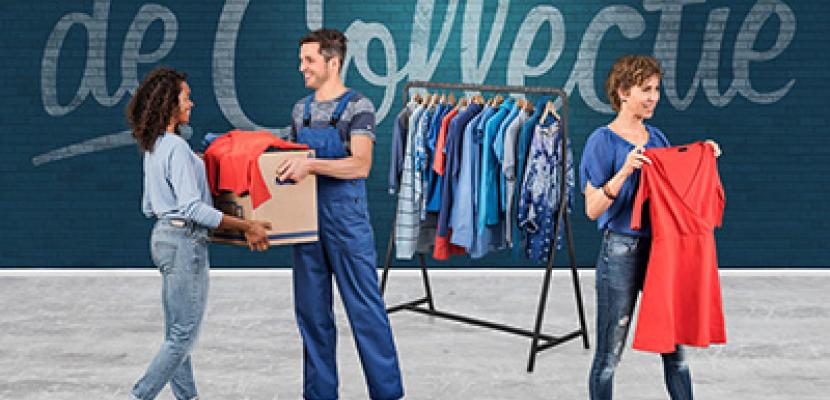Image

The Collection, improving textile waste collection
Published on 01 September 2020

Belgium
Prov. Antwerpen
This is the good practice's implementation level. It can be national, regional or local.
About this good practice
In 2015 the city of Antwerp wanted to have a better solution for textile waste. Until then, the textiles were collected in containers on the public domain. This caused a lot of illegal dumping in and around the containers. The collected clothes were also mostly shipped to third world countries.
In 2015 the city started a collaboration with non-profit consortium “The Collection”, a collaboration of 5 non-profit organizations. Following this, The Collection collects textiles, clothing, shoes and leather goods at home or gives inhabitatns of the city the chance to bring them in to one of the many delivery points in the city of Antwerp.
The textiles are sorted and locally sold as much as possible.
A concession agreement was made with these objectives:
* Collection: clearly communicated and structured
* Processing: maximum local reuse, encouraging the collection and sale of reusable textiles
* Reporting, follow-up and adjustment: indicators
The agreement runs for 5 + 3 years and stipulates that The Collection gets the right to collect all textile waste in the city. Collection is done by
• Home to home collection
• By appointment
• Textile containers in recycling parks
• Network of delivery points
The Collection has a Unique combination of goals/charities:
• Social workplaces
• Local charity for childeren, people in need, …
• Global charity projects, Third World countries
• Voluntary work
In 2015 the city started a collaboration with non-profit consortium “The Collection”, a collaboration of 5 non-profit organizations. Following this, The Collection collects textiles, clothing, shoes and leather goods at home or gives inhabitatns of the city the chance to bring them in to one of the many delivery points in the city of Antwerp.
The textiles are sorted and locally sold as much as possible.
A concession agreement was made with these objectives:
* Collection: clearly communicated and structured
* Processing: maximum local reuse, encouraging the collection and sale of reusable textiles
* Reporting, follow-up and adjustment: indicators
The agreement runs for 5 + 3 years and stipulates that The Collection gets the right to collect all textile waste in the city. Collection is done by
• Home to home collection
• By appointment
• Textile containers in recycling parks
• Network of delivery points
The Collection has a Unique combination of goals/charities:
• Social workplaces
• Local charity for childeren, people in need, …
• Global charity projects, Third World countries
• Voluntary work
Expert opinion
The textiles industry is one of the largest industry sectors and an important employer in Europe. However, textile production and consumption also cause significant environmental and climate impacts by using resources, water, land and chemicals and emitting greenhouse gases and pollutants. Today, EU consumers discard almost 6 million tons of textiles every year and used textiles are rather down-cycled whilst recycling remains minimal.
In this light, the good practice from Antwerp offers a new approach to used textiles collection. The collaboration with local NGOs ensures that used textiles are sorted and sold rather than landfilled or exported outside Europe. This excellent solution is easily transferable to other regions and municipalities.
In this light, the good practice from Antwerp offers a new approach to used textiles collection. The collaboration with local NGOs ensures that used textiles are sorted and sold rather than landfilled or exported outside Europe. This excellent solution is easily transferable to other regions and municipalities.
Works at
Interreg Europe Policy Learning Platform
Resources needed
Once the agreement was made, the cost for the city of Antwerp is zero. All collection, sorting and selling is done by The Collection.
Evidence of success
Inflow textile
2017: 1,200 tonnes (+ 10% 2016)
Target = 4,000 tonnes by 2021 (OVAM research)
Successes:
• The Collection has a clear mission and vision
• Increase in textile collection
• Develop a broad network
o Delivery points
o Creative reuse
2017: 1,200 tonnes (+ 10% 2016)
Target = 4,000 tonnes by 2021 (OVAM research)
Successes:
• The Collection has a clear mission and vision
• Increase in textile collection
• Develop a broad network
o Delivery points
o Creative reuse
Potential for learning or transfer
The project is easily transferable to other cities. The advantages being less litter and illegal dumping, better output for collected textiles in local 2nd hand shops.
Further information
Website
Good practice owner
You can contact the good practice owner below for more detailed information.
Organisation
De Kringwinkel vzw

Belgium
Prov. Antwerpen
Contact
Expert Communication
